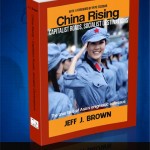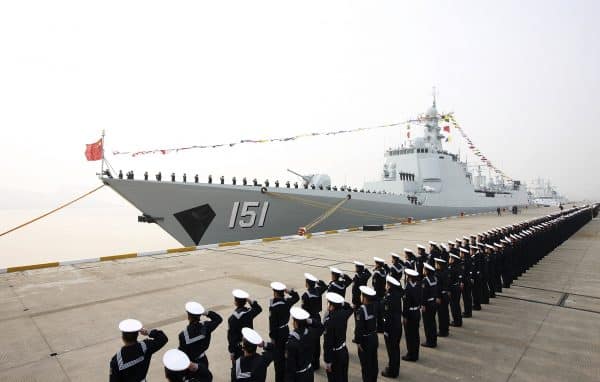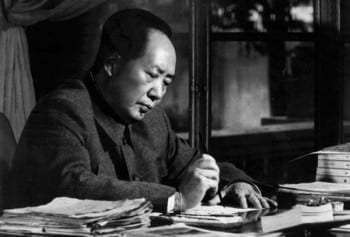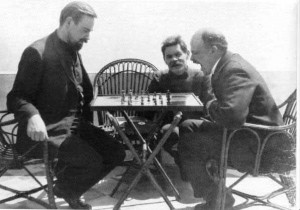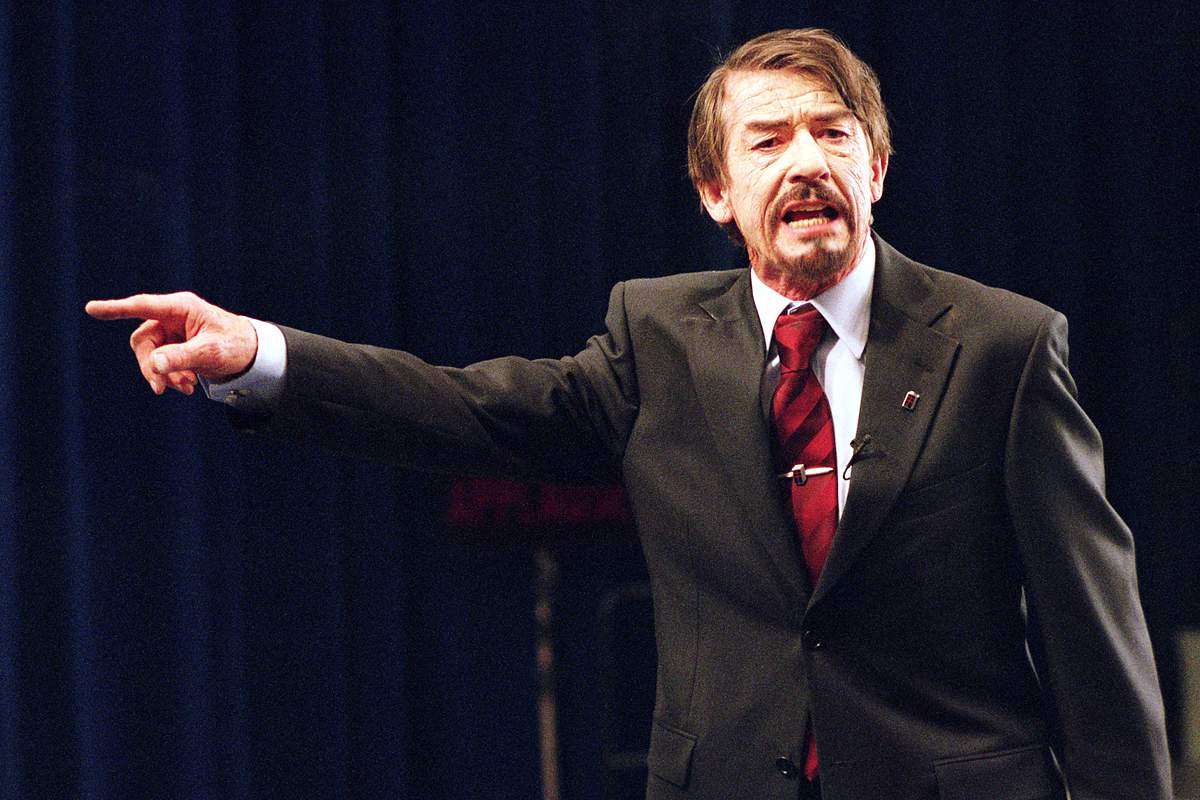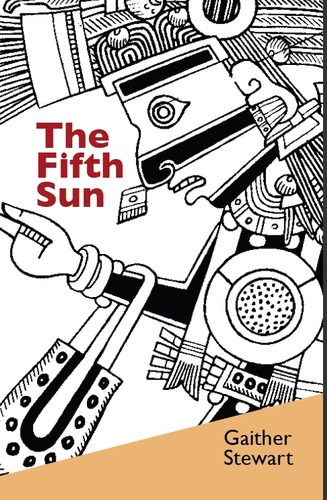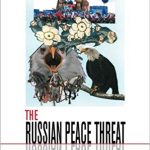
TRADE PRESS RELEASE
RON Ridenour’s The Russian Peace Threat (RPT-1) has just been released by Punto Press and commenced broad distribution. The 564 pp book represents an in-depth, up-to-date examination of the struggle between Russia and the United States (and its allies) since the former declared a socialist revolution in 1917. A lifelong activist for socialism, Ron Ridenour has had firsthand experience with American meddling in the affairs of Russia, and with Washington’s none-too-subtle efforts by its agencies, media, fifth columnists, and military to encircle, destabilise and eventually suffocate the attempts of Russia to set a sovereign course in domestic and international affairs. America’s continued hostility and hegemonist policies are now pushing the world toward a possible devastating nuclear confrontation. All of this is amply documented by Ridenour.
RPT-1’S projected publicity program for the summer/fall period includes a variety of channels, with Amazon and Ganxy in the first tier of national and international sales, to be followed by ancillary channels. Punto Press is also seeking to arrange interviews for the author with PressTV, teleSUR, Black Agenda Report, and other venues, to be later disseminated via our flagship website (The Greanville Post), YouTube channels and collaborating media. Electronic versions of the book are being made available to editors and writers wishing to comment on this volume.
Below we reproduce one of the launching pads for this campaign, using excerpts from the book on The Greanville Post. The post includes a Ganxy module enabling select readers to download free copies of RPT in eBook formats.
- Paperback: 564 pages (Also available in electronic formats)
- Publisher: Punto Press, LLC; 1 edition (June 22, 2018)
- Language: English
- ISBN-10: 0996487069
- ISBN-13: 978-0996487061
- Product Dimensions: 6 x 1.3 x 9 inches
- Shipping Weight: 2.1 pounds
- Average Customer Review:
PP CATALOG ID: RPT-1
—VC
Please refer all inquiries or request for review copies to Vivien Conroy, at vivienconroyvt@puntopress.com, or contact Susan Brown at thepublishers@puntopress.com .
THE RUSSIAN PEACE THREAT
CHAPTER 19
American Exceptionalism
![]()

The Russian Peace Threat, Punto Press, 2018 (New York), 564 pp. On Amazon HERE
AMERICAN EXCEPTIONALISM IS an ideology in itself. It holds that “America” is unique among all countries for being a “land of opportunities”. Americans are unique among all peoples for their ideals of democracy, liberty, personal freedom, individualism— that everyone who works hard regardless of roots or class can become rich and even become a president—everyone who is white and male, that is. That last caveat was the “exception to the rule” of American Exceptionalism until the 20th century when, first women and later black people could officially be equal, and could occupy the White House built by African slaves. (1)
French political scientist and historian Alexis de Tocqueville was the first writer to describe the country as “exceptional” in his book, Democracy in America (1835).
American Exceptionalism embraces Manifest Destiny—the belief that it is Americans’ destiny to expand their “exceptional” qualities first throughout the Americas, in mid-19th century, and later to the whole world—spreading the good word with sword and movies. Many believe Americans are chosen by God to civilize the world, to bring the world its democracy. The first war fought with “god on its side” was against Mexico (chapter 18).
This superior view of America’s place in the world was already codified in 1823 with the Monroe Doctrine, named after President James Monroe’s foreign policy. First it warned Europe that Latin America was to come under United States doctrine while Europe could keep its other colonies.
Abraham Lincoln stated in the Gettysburg address (1863) that Americans have a duty to ensure that “government of the people, by the people, for the people, shall not perish from the earth.” got interpreted to mean it is Americans’ mission to extend their superiority over other nations.
Many presidents took up the term American Exceptionalism in their wars, among them: Ulysses Grant, Theodore Roosevelt, Dwight Eisenhower, John F. Kennedy and Ronald Reagan.
While American Exceptionalism does not apply only to one religion or ethnic group (in later years blacks could be included), it is akin to what many Jews believe of themselves as being God’s “chosen people”, entitled to the Palestinian “promised land…of milk and honey” at the expense of the Arab peoples. U.S. manifest destiny promoters accept this postulate as it aids their drive for Middle Eastern oil—so much so that for the only time in history, it looked the other way when another state attacked it. The survivors of the USS Liberty know this first hand after Israel bombed their ship for hours and killed 34 American sailors. ( http://www.whatreallyhappened.com/WRHARTICLES/ussliberty.html )
The actual phrase American Exceptionalism may have originated in the Soviet regime of Joseph Stalin. He condemned many American Communists, including some leaders, who suggested that the U.S. was impervious to communist ideals, that American workers were “exceptional” because there were no rigid class distinctions, and they would not embrace a socialist revolution. With minor exceptions few workers have, in fact, embraced the classic Marxist concepts of the need for class struggle and socialist revolution.
Why is that? Colleague Gaither Stewart writes in “The Greanville Post”, October 2, 2017:
“In a great dialectic the survival needs of the bourgeoisie generate the resistance that can ultimately crush it—the resistance that according to Marxist theory will crush it someday. These days, there for everyone to see, for everyone to feel, is the spreading sense of unease marking its successive economic- financial crises point to the eventual demise of bourgeois, bandit capitalism.
So why has it not already happened, one must wonder? Why hasn’t it collapsed long ago? ough the bourgeoisie—capitalist class— is small and the proletariat wage earners an overwhelming majority, why don’t the exploited classes rebel and rebel, revolt and revolt, again and again? Why not? e reason is clear: the exploited classes are not only victims. ey are also accomplices—half victim, half accomplice. e historical paradox! e ruling class counts on this dichotomy to maintain the system. Divide and rule. Meritocracy. Rewards for obedience. Two cars and bigger houses for staying in line. A system based on money, domination, pervasive indoctrination of Orwellian proportions, and fear. Religion too, and FEAR. Fear of fear. Fear of change. Fear, fear, fear. A fearful people is an obedient people.” (https://www.greanvillepost.com/2017/10/02/definitions-the-bourgeoisie/ )
I agree with Stewart and add that the U.S. capitalist class can afford to give a bit more to many of its homeland exploited as the capitalists exploit workers in “third world” countries all the more. They create false consciousness through the divide and conquer rule, and by instilling fear.
American Exceptionalism works best on Americans when they convince themselves to believe the ruler’s lies thereby maintaining their ignorance. They feel safe by refusing to see the truth, by accepting the rules for fear of losing their jobs, fear of being outcast by friends and family, fear of being jailed or even killed if they decide to seek the truth and then act upon it. at is what stands behind a lot of America’s racist and genocidal violence perpetrated by the white working class clothed in overalls or military uniforms under the orders of the ruling elite.
My editor, Patrice Greanville, a onetime academic and lifelong media and social critic, with a multicultural background in Europe and Latin America, has also found American Exceptionalism a compelling phenomenon. In correspondence with me, he offers some thoughts on why so many Americans may have come to believe they are superior to other peoples and all other countries. The material below is excerpted from a monograph in preparation:
American exceptionalism is one of those peculiarities that make the U.S. such an exasperating enigma to so many people around the world. Exceptionalism, per se, is just one form of chauvinism, itself an offshoot of tribalism, a recognition that humans are (and feel) divided by real or imagined differences, and that many tend to feel superior to others.
Just about every country under the sun today—big and small, old and young— is chauvinist in some way. Bolivia and Chile, I know for a fact, are chauvinist, and so is Brazil and France, of course, and Britain, and Italy—as anyone attending an international soccer match can attest—is in a class by itself. Russia, naturally, to some extent, shares this trait, too, and even China and India, both ancient, foundational civilisations noted for their inner balance and firm identities, also show instances of national vanity. The Germans even had a national anthem once proclaiming to be “uber alles”—it doesn’t get more explicit than that. Little Togo is probably chauvinist in its own peculiar way. So “exceptionalism” is not that rare at all.
But, there are degrees of chauvinism among nations, like differences in temperament, in narcissism, and these differences can have serious consequences. In that sense—as shown by recent polls—US chauvinism is very pervasive. It’s chauvinism on steroids—insistent, intrusive, obnoxious, and even devious.
And these are just what we might call its “mundane” characteristics, where it most resembles other cases of acute national self-approval. The problem is that narcissism at the national level is no less toxic a personality disorder than at the individual level. And when this trait defines the character of a reality-averse, often petulant jejune superpower, US exceptionalism really becomes a threat to everything alive on the face of this planet. How did this monstrous deformation come to occupy the center of US political life, to be seen as a “foundational belief ” with many of the accoutrements of a de facto religion? I say religion because religions are not supposed to be questioned in their logic or factuality.
A closer look at US exceptionalism begins to give the game away. It finds its claims false or undistinguished and its uses malignant: The ideal mask for modern US imperialism, immunising it, at least in the eyes of the vastly disinformed home populace, against any and all possible charges of impure intent and wanton criminality. But the exceptionalist myth, an organism comprised of subsidiary mythologies, goes even further: wrapped in its customary sanctimoniousness, it grants the ruling plutocrats unlimited access to the blood, muscle and treasure of most ordinary Americans, while also proclaiming with the audacity of a shameless mountebank the right of the United States to be acknowledged as the world’s natural leader, the “indispensable nation” under God.
Casual observers might think the rise of exceptionalism was largely spontaneous: a nation of immigrants—the losers fleeing Europe’s brutal class wars—showing, rather compulsively, their eternal gratitude to the new land of opportunity. But they would be mistaken. Nothing with real power consequences is ever that accidental or left to chance in America, especially when it has been found by the ruling orders to be an extremely useful tool in the management of their subject population. To paraphrase media analyst pioneer Alex Carey, the American system of pseudo democracy saw in exceptionalism’s multifaceted manifestations another terrific instrument to “take the risk out of democracy,” something the Founding Fathers themselves had been keenly interested in and maneuvered to implement. ( They mostly succeeded.). In a way, the immigrants’ naive vision of America gave the expansionist wing of the US ruling class, the folks who had embraced Manifest Destiny with a passion, and already stolen half of Mexico by mid 19th century, a shot in the arm, the ultimate seal of approval.
John Gerassi, a noted Latin Americanist and political scientist had little trouble puncturing the conceits of US exceptionalism, and by extension its devilish spawn, US foreign policy, a criminal enterprise, with rare lapses, almost from inception. Speaking about Manifest Destiny, something Bolivar and Marti also warned us about, he states:
“That has been our policy in Latin America. It began in recognizable manner in 1823 with President Monroe’s declaration warning non-hemisphere nations to stay out of the American continent. Because of its rhetoric, America’s liberal historians interpreted the Monroe Doctrine as a generous, even altruistic declaration on the part of the United States to protect its weaker neighbors to the south. To those neighbors, however, that doctrine asserted America’s ambitions: it said, in effect, Europeans stay out of Latin America because it belongs to the United States. A liberal, but not an American, Salvador de Madariaga, once explained its hold on Americans:
‘I only know two things about the Monroe Doctrine: one is that no American I have met knows what it is; the other is that no American I have met will consent to its being tampered with. That being so, I conclude that the Monroe Doctrine is not a doctrine but a dogma, for such are the two features by which you can tell a dogma. But when I look closer into it, I find that it is not one dogma, but two, to wit: the dogma of the infallibility of the American President and the dogma of the immaculate conception of American foreign policy.’” (Violence, Revolution, and Structural Change in Latin America, https://www.greanvillepost.com/2018/02/21/ violence-revolution-and-structural-change-in-latin-america/).
As promulgated by its national identity myth, America is good, was born good, and can only do good. We have an obligation to share our good with other nations. It follows that if the immaculate conception defines our highly moral foreign policy, our similarly excellent economic system—capitalism—or “free enterprise” if you like—could and must define “americanness”, what to be an American, a truly free individual, really means, not to mention the onetime much envied “American Way of Life.”
For only in the US to be against capitalism is also to be “un-American”, a suspect in patriotic virtue, an illogical and absurd construct that no one seems to notice, let alone oppose, due to the sheer enforced ubiquity of the concept due to nonstop propaganda legitimating it. In Italy, Germany, Mexico, France, or even England, where capitalism first matured, the idea of calling, say, a British communist “anti-British” or an Italian socialist “anti-Italian”, would sound odd if not downright laughable. But not here. How come?
Built on a tissue of mostly transparent lies that few rational minds would have difficulty uncovering, the exceptionalist myth is enormously resilient. Cursory inspection reveals layer upon layer of self-flattering claims and assumptions (many riddled with contradictions), while thick hypocrisy lubricates every nook and cranny of the mendacious edifice, making the whole a well-integrated, smoothly functioning imperialist ideology ideally tailored to a population that believes itself to inhabit a democracy. As the author points out at the beginning of this chapter, US exceptionalism is no run-of-the-mill hyper-nationalism as we observe in other nations; it is a full-blown catechism informing and enabling many aspects of the US governmental apparatus. Indeed, the “American Way of Life” never had a deeper meaning than in this essential aspect of its existence. For—to the misery of the world—the US ruling class has learned to use this ideology adroitly for conquest and subversion abroad and pacification at home.
Empires, however, especially compulsory hegemonists like the U.S., do not do well in holy matrimony with genuine democracies. One tends to exclude and cancel the other. In the U.S., with a very weak or pretend democracy, this organic tension does not really exist, although the task of keeping appearances is becoming increasingly challenging to all the main parties involved. The fact is that Americans now live in a violent, lawless empire, not a regular nation, the US homeland merely serving as the outward carapace for the business of the transnational capitalist hegemon, whose sole object is to advance and defend the interests of the global plutocracy, of which the US branch is (still) the undisputed leader.
This is is of course a fraud of colossal proportions, especially for trusting souls stuck on Civics 101, but one which the propaganda system is still managing to keep afloat. Fractures on the bubble’s wall are finally starting to appear. As certified now even by Ivy League political scientists, the US is only a make-believe democracy. With the core unit of capitalism, the corporation, as the dominant social engine, the whole nation’s dynamic issues from a hierarchic tyranny.
An article by investigative historian Eric Zuesse confirms this heretical finding:
“A study, to appear in the Fall 2014 issue of the academic journal Perspectives on Politics, finds that the U.S. is no democracy, but instead an oligarchy, meaning profoundly corrupt, so that the answer to the study’s opening question, ‘Who governs? Who really rules?’ in this country, is: “Despite the seemingly strong empirical support in previous studies for theories of majoritarian democracy, our analyses suggest that majorities of the American public actually have little influence over the policies our government adopts. Americans do enjoy many features central to [formal, not substantive] democratic governance, such as regular elections, freedom of speech and association, and a widespread (if still contested) franchise. But, they go on to say,
“America’s claims to being a democratic society are seriously threatened” by the findings in this, the frst-ever comprehensive scientific study of the subject, which shows that there is instead ‘“the nearly total failure of ‘median voter’ and other Majoritarian Electoral Democracy theories [of America]. When the preferences of economic elites and the stands of organized interest groups are controlled for, the preferences of the average American appear to have only a minuscule, near-zero, statistically non-significant impact upon public policy.”
To put it short: the United States is no democracy, but actually an oligarchy. The authors of this historically important study are Martin Gilens and Benjamin I. Page, and their article is titled ‘Testing eories of American Politics.’ The authors clarify that the data available are probably under-representing the actual extent of control of the U.S. by the super-rich.” (See “US Is an Oligarchy Not a Democracy, says Scientific Study”, by Eric Zuesse, Common Dreams, April 14, 2014 (https://www.commondreams.org/views/ 2014/04/14/us-oligarchy-not-democracy-says-scientific-study).
While Gilens and Page document the long known fact that the super rich are no friends of democracy, they are coy in naming capitalism as the system that makes the rise of tycoons inevitable.
But enormous wealth concentration has other highly toxic effects in America. The grotesque inequality and non-existence of actual governing power by the masses at home has been the hidden counterpart to the brutal imperialistic regime abroad implemented by the native elites, something to which hundreds of millions of people in scores of nations, large and small, can attest. In this manner, protected by its “exceptionalist” propaganda endowing it with axiomatic, unerring, moral superiority, and (as tirelessly proclaimed by its ruling class) charged with the “sacred duty” to carry “freedom and democracy” to all corners of the planet, the US has been able to lead a sordid double life for almost 200 years: arguably mostly Dr Jekyll at home, murderous meddlesome Mr Hyde across the globe.
Some readers no doubt will argue at this point that it was capitalism that gave America the distinction of being the first nation to spawn a large, affluent middle class, with many of its members living as well or better than their social superiors in the old world.
While this is true in the narrow sense, the phenomenon was largely a historical accident not inherent in capitalism. It was war spending—a form of military Keynesianism—that rescued America from a still debilitating Great Depression. The timing of modern era’s European wars to divide the world’s “colonial spoils”, also serendipitous, presented America with extremely fortunate opportunities to develop its industrial might and political clout. Indeed except for self-inflicted wounds such as the Civil War the U.S. has enjoyed uninterrupted peace in its own homeland for over three centuries thanks to its exquisite geostrategic location, making it a virtual island continent flanked by two gigantic oceans and two weak powers, one an easy target for land grabs, Mexico, the other—Canada—a satellite of a declining empire almost from inception. Thus, by 1945 America stood as the sole world superpower with both its population and industrial infrastructure virtually intact, and in a state of readiness to flood the world with its cornucopia of goods, all of which allowed labor to negotiate better terms and capitalists to grant them, thereby laying the groundwork for the age of affluence that characterised the “golden years” of US capitalism.
Add to this the infusion of cheap labor for many generations via mass immigration due to the deplorable European and other old world class systems, coupled with another great accident, having the best topsoil in the world, and you get the makings of a veritable miracle in US agriculture: the most productive, even without its high quotient of early mechanization.
Thus, when we compare Russian/Soviet and U.S. agricultural output, the “fix was in”, so to speak. Besides being poor, in turmoil, with its underdeveloped infrastructure in shambles for a long time due to war wounds, and encircled by enemies, Russians had to contend with one of the hardest lands to cultivate, a lot of it permafrost. Yes, the USSR/Russia territory is big, 11 time zones, but a lot of that is essentially not very fertile. This advantage which was paraded as a triumph of capitalism over socialism was again, when examined, based on serendipity, an accident of nature. Virtually all the conceits of the “indispensable nation” to justify its sociopathic imperialist trajectory are grounded in bunk. No wonder that historical truth is persona non grata in America.
It should be clear by now that the main purpose of cultivating the exceptionalist myth is to bolster the fortunes of the global capitalist elites, with the Americans in the vanguard, primus inter pares. This prompts a final question: Can we envision a strong, capitalist America, not needing its claims to exceptionalism? Yes we can, but that nation would also be inherently diseased, riddled with incurable sociopathies, and ultimately unviable. The short answer to this is because capitalism itself is a highly unstable, inherently amoral, self-liquidating system. As it grows old, passing from its competitive phase to monopoly, and from a deficient democracy to plutocratic imperialism, it generates more and more contradictions that eventually make it insufferable to everything living under its dominion. Capitalism is a terminal condition. It cannot be fixed. (Excerpted from Understanding US Exceptionalism, a monograph in preparation, P. Greanville, 2018).
What the Yankees have always been good at is deception, especially among whites by enlarging their colorless ego through nearly all the mass media, entertainment and cultural forms. the land of opportunity, and many others, is there for the taking…for whites. If there is not enough backing within the population or among international ally vassals for yet another aggressive war then creating conditions for the wanted war can be accommodated. There are many examples:
1. “Remember the Maine” was the slogan media mogul William Randolph Hearst used to whip up war fury against Spain, in order to take effective control of Cuba by preventing Cubans from winning their anti-colonial liberation war alone. (chapter three)
2. President Lyndon Johnson did the military-industrial complex the favor of reversing JFK’s initiation of ending the war against Vietnam by fabricating a Vietnamese attack on the USS Maddox in the Gulf of Tonkin. He convinced Congress with this lie to grant him a war without naming it as one. The Gulf of Tonkin Resolution granted the presidency the use of all “necessary” force, which ended in the murder of millions of human beings. (chapter 12)
3. The lie that led to the totally superfluous atomic bombing of Hiroshima and Nagasaki. (chapter 12)
4. The many lies about the terror attack on September 11, 2001, in which some “chickens did come home to roost”, and lay the basis for invasions in the Middle East and North Africa.
The chicken roosting simile I associate with morality. Many of the terrorist victims were co-responsible for America’s many wars and oppressive domination of other peoples, a moral issue I take up in an agonizing essay. (https://www.ronridenour.com/articles/2002/0101–rr.htm)
I do not know for certain if elements in the U.S. government were co-responsible for the attacks on that day but I do know that there was no defense against these attacks since it seems the entire military apparatus was on an exercise. The training dealt with how to combat such terror attacks. If there were only 19 terrorists directly involved, it seems more than odd that they would choose that propitious day without inside knowledge; also odd that 15 of them were from Saudi Arabia, whose diplomats and bin Laden family members were let free to fly away when no one else could.
It is also odd that Israeli intelligence agents were seen applauding the Twin Towers explosions. Five Israelis were arrested and detained for 71 days. FBI counterintelligence concluded at least two worked for Israeli intelligence, but they were let go, deported to Israel.
Dylan Avery and Jason Bermas made the documentary film Loose Change that is used widely by the 9/11 Truth movement. The film asserts that Flight 77 could not have accounted for the damage at the Pentagon, that the Twin Tower fires were insufficient to cause their collapse, and that cell phone calls from the hijacked airplanes would have been impossible at the time.
How can it be that thousands of architect and engineer professionals demand a new investigation into the cause of the attacks? Michael Moore’s Fahrenheit 9/11 is a powerful documentary about this. Many Hollywood stars and even a former Minnesota governor, Jesse Ventura, speak about the government lies and the need for an independent, honest investigation. (http://911truth.org/achievements/events- campaigns-to-expose-911-truth/)
Harold Pinter 2005 Nobel Literature Prize Speech
While it is not Pinter’s intent to make the chicken-roosting judgment that I do, his poignant speech in acceptance of the Nobel Prize for Literature shows some of the reasons why some seek revenge.
“…the majority of politicians…are interested not in truth but in power and in the maintenance of that power. To maintain that power it is essential that people remain in ignorance, that they live in ignorance of the truth, even the truth of their own lives. What surrounds us therefore is a vast tapestry of lies, upon which we feed.
As every single person here knows, the justification for the invasion of Iraq was that Saddam Hussein possessed a highly dangerous body of weapons of mass destruction, some of which could be fired in 45 minutes, bringing about appalling devastation. We were assured that was true. It was not true. We were told that Iraq had a relationship with Al Quaeda and shared responsibility for the atrocity in New York of September 11th 2001. We were assured that this was true. It was not true. We were told that Iraq threatened the security of the world. We were assured it was true. It was not true.
The truth is something entirely different. The truth is to do with how the United States understands its role in the world and how it chooses to embody it.”
“The United States supported and in many cases engendered every right wing military dictatorship in the world after the end of the Second World War. I refer to Indonesia, Greece, Uruguay, Brazil, Paraguay, Haiti, Turkey, the Philippines, Guatemala, El Salvador, and, of course, Chile.
The horror the United States inflicted upon Chile in 1973 can never be purged and can never be forgiven.
Hundreds of thousands of deaths took place throughout these countries. Did they take place? And are they in all cases attributable to US foreign policy? The answer is yes they did take place and they are attributable to American foreign policy. But you wouldn’t know it.
It never happened. Nothing ever happened. Even while it was happening it wasn’t happening. It didn’t matter. It was of no interest. The crimes of the United States have been systematic, constant, vicious, remorseless, but very few people have actually talked about them. You have to hand it to America. It has exercised a quite clinical manipulation of power worldwide while masquerading as a force for universal good. It’s a brilliant, even witty, highly successful act of hypnosis.
I put to you that the United States is without doubt the greatest show on the road. Brutal, indifferent, scornful and ruthless it may be but it is also very clever. As a salesman it is out on its own and its most salable commodity is self love. It’s a winner. Listen to all American presidents on television say the words, ‘the American people’, as in the sentence, ‘I say to the American people it is time to pray and to defend the rights of the American people and I ask the American people to trust their president in the action he is about to take on behalf of the American people’.
It’s a scintillating stratagem. Language is actually employed to keep thought at bay. The words ‘the American people’ provide a truly voluptuous cushion of reassurance. You don’t need to think. Just lie back on the cushion. The cushion may be suffocating your intelligence and your critical faculties but it’s very comfortable. This does not apply of course to the 40 million people living below the poverty line and the 2 million men and women imprisoned in the vast gulag of prisons, which extends across the US.
The United States no longer bothers about low intensity conflict. It no longer sees any point in being reticent or even devious. It puts its cards on the table without fear or favor. It quite simply doesn’t give a damn about the United Nations, international law or critical dissent, which it regards as impotent and irrelevant. It also has its own bleating little lamb tagging behind it on a lead, the pathetic and supine Great Britain.”
“Its official declared policy is now defined as ‘full spectrum dominance’. That is not my term, it is theirs. ‘Full spectrum dominance’ means control of land, sea, air and space and all attendant resources.”
“What has happened to our moral sensibility? Did we ever have any? What do these words mean? Do they refer to a term very rarely employed these days—conscience? A conscience to do not only with our own acts but to do with our shared responsibility in the acts of others? Is all this dead?” (Art, truth & Politics, 2005 https://www.nobelprize.org/mediaplayer/index.php?id=620)
John Rohn Hall calls American Exceptionalism “the illusion of choice.” “Sleeping through the American Dream, still believing the lies, counting on the lies, clinging to the lies like their lives depend upon it. Empire’s Misinformation Machine knows the drill. Well learned from blood brother Adolph: ‘If you tell a big enough lie and tell it frequently enough, it will be believed.’” (https://dissidentvoice.org/ 2017/08/empires-day-of-reckoning/)
Barack Obama the Worst American President
President Barack Obama used the term American Exceptionalism more than any other president—perhaps to “compensate” for the racist riff -raff hatred against him because of his skin color.
A Washington Post May 28, 2014 headline read: “Obama’s New Patriotism: How Obama has used his presidency to redefine ‘American Exceptionalism’”.
Greg Jaffe wrote: “No American president has talked about American Exceptionalism more often and in more varied ways than Obama. As an Illinois state legislator, young U.S. senator and presidential candidate, he spoke about it most frequently through the prism of his own remarkable story. His father had grown up in Kenya herding goats. His wife carried ‘blood of slaves and slave owners,’ he noted during his first presidential campaign. He had brothers and sisters, nieces and nephews of every race and many religions, scattered across continents.”
“In Libya, many of his top advisers, including his defense secretary, urged him not to use the U.S. military to protect citizens from attacks by forces loyal to dictator Moammar Gaddafi. The United States didn’t need another war in a country of only peripheral interest. Obama overruled them, citing America’s ‘indispensable’ role.” (http://www.washingtonpost. com/sf/national/2015/06/03/obama-and-american-exceptionalism/ ?utm_term=.56ee66d9c6f7)
Obama used the al Qaeda lie that they knew Gaddafi would “massacre” them in a day. His (and Hillary Clinton) war on Gaddafi is what they call preemptive war, something Zionists have used against Arab countries at will.
Eight months before the Washington Post article, in September 2013, Obama was about to war on Syria, because of another terrorist lie [a western false flag] that the government had used sarin gas to kill people. (chapter 15). President Putin warned him about using “American Exceptionalism” to commit a military invasion that could easily lead to a world war. Despite the “New York Times” alliance with the war-machine it wisely published his opinion piece and on a special day, September 11 (2013): “A Plea for Caution” by Vladimir V. Putin.
“Recent events surrounding Syria have prompted me to speak directly to the American people and their political leaders. It is important to do so at a time of insufficient communication between our societies. Relations between us have passed through different stages. We stood against each other during the cold war. But we were also allies once, and defeated the Nazis together. The universal international organization—the United Nations—was then established to prevent such devastation from ever happening again.”
With a prayer for peace the man most demonized by U.S. politicians and their media concluded:
“My working and personal relationship with President Obama is marked by growing trust. I appreciate this. I carefully studied his address to the nation on Tuesday. And I would rather disagree with a case he made on American exceptionalism, stating that the United States’ policy is ‘what makes America different. It’s what makes us exceptional.’ It is extremely dangerous to encourage people to see themselves as exceptional, whatever the motivation. There are big countries and small countries, rich and poor, those with long democratic traditions and those still finding their way to democracy. Their policies differ, too. We are all different, but when we ask for the Lord’s blessings, we must not forget that God created us equal.”
(http://www.nytimes.com/2013/09/12/opinion/putin-plea- for-caution-from-russia-on-syria.html?_r=0)
John Pilger is not nearly as diplomatic as President Putin in his description of Obama’s embrace of American Exceptionalism. Excerpts from his piece, “ The Issue is not Trump, It is us”:
“One of the persistent strands in American political life is a cultish extremism that approaches fascism. This was given expression and reinforced during the two terms of Barack Obama. ‘I believe in American Exceptionalism with every fiber of my being,’ said Obama, who expanded America’s favorite military pastime, bombing, and death squads (‘special operations’) as no other president has done since the Cold War. (https://www.greanvillepost.com/2017/01/16/the-issue-is-not-trump-it-is-us/)
“According to a Council on Foreign Relations survey, in 2016 alone Obama dropped 26,171 bombs. That is 72 bombs every day. He bombed the poorest people on earth, in Afghanistan, Libya, Yemen, Somalia, Syria, Iraq, Pakistan.
“Every Tuesday—reported The New York Times—he personally selected those who would be murdered by mostly hellfire missiles fired from drones. Weddings, funerals, shepherds were attacked, along with those attempting to collect the body parts festooning the “terrorist target”. A leading Republican senator, Lindsey Graham, estimated, approvingly, that Obama’s drones killed 4,700 people. ‘Sometimes you hit innocent people and I hate that,’ he said, ‘but we’ve taken out some very senior members of Al Qaeda.’”
“Under Obama, the US has extended secret ‘special forces’ operations to 138 countries or 70 per cent of the world’s population. The first African- American president launched what amounted to a full-scale invasion of Africa. Reminiscent of the Scramble for Africa in the late 19th century, the US African Command (Africom) has built a network of supplicants among collaborative African regimes eager for American bribes and armaments…It is as if Africa’s proud history of liberation, from Patrice Lumumba to Nelson Mandela, is consigned to oblivion by a new master’s black colonial elite whose ‘historic mission’, warned Frantz Fanon…is the promotion of ‘a capitalism rampant though camouflaged’”.
 I also wrote my take on Obama’s significance. In my view he is the worst U.S. president ever because he was the greatest hope especially for African-Americans, other people of color, and white liberals/ progressives. They kept hoping for years without protesting his wars and plundering for the rich. Some even rationalized his wars. See https://dissidentvoice.org/2013/03/obama-the-worst-us-president-ever/
I also wrote my take on Obama’s significance. In my view he is the worst U.S. president ever because he was the greatest hope especially for African-Americans, other people of color, and white liberals/ progressives. They kept hoping for years without protesting his wars and plundering for the rich. Some even rationalized his wars. See https://dissidentvoice.org/2013/03/obama-the-worst-us-president-ever/
“He is THE president for US corporations. With his black Kenyan roots he can walk into Africa’s rich parlors and black White houses and communicate with these butchers better than any of the capitalist class’ other presidents, all white.
“Obama is worse than them because he betrays all his black ‘brothers and sisters’ in the US, all except a few rich and opportunistic ones. He was THE hope; he would improve their lot, and that of the poor, the working people. He has done nothing. Instead, he takes from them to give to the rich, the worst criminals on Wall Street, the war arms industry, the oil and mineral industries.”
Another element in American Exceptionalism is the phenomenon of American citizens’ shooting wars against their own people. There were “only 290” mass shooting murder incidents (four or more killings) in Obama’s last year while Trump’s first year was the deadliest of all— 345; one every nine of ten days. Americans commit more mass shooting murders than any other country: one-third of them. October 1 was the biggest single citizen murder day in U.S. history when a 64-year old wealthy man killed 58 persons and wounded 500 at an outdoor concert in Las Vegas.
LULLABY
Little war child, where are you going?
East or west?
Where in the world do you believe you can nd a friend? Little war child, what suits you best:
A worn carpet?
A plywood co n?
A life jacket?
Little war child, where will you die:
Where the bombs fall
Or in the open sea?
Little war child, where do you want to go?
Choose yourself. Just we
Shall never see you again
(By Henrik Nordbrandt, a Danish poet, winner of nordic council’s 2000 Literature Prize. translated by this author with his permission)
WHAT To Do
John Pilger concluded his article with the most pressing question of the century— “…when will a genuine movement of opposition arise? Angry, eloquent, all-for-one-and-one-for all. Until real politics return to people’s lives, the enemy is not Trump, it is ourselves!”
Harold Pinter is in step: “I believe that despite the enormous odds which exist, unflinching, unswerving, fierce intellectual determination, as citizens, to define the real truth of our lives and our societies is a crucial obligation which devolves upon us all. It is in fact mandatory.
“If such a determination is not embodied in our political vision we have no hope of restoring what is so nearly lost to us – the dignity of man,” Harold Pinter concluded his speech.
Canadian professor Michel Chossudovsky addresses the issues Pilger and Pinter raise, in his January 9, 2018 article, “ The Empire’s ‘Lefty Intellectuals’ Call for Regime Change. The Role of ‘Progressives’ and the Antiwar Movement” (https://www.globalresearch.ca/the-empires- lefty-intellectuals-call-for-regime-change-the-role-of-progressives- and-the-antiwar-movement/5625333)
“What is now unfolding in both North America and Western Europe is fake social activism, controlled and funded by the corporate establishment. This manipulated process precludes the formation of a real mass movement against war, racism and social injustice.
The anti-war movement is dead. The war on Syria is tagged as ‘a civil war’.
The war on Yemen is also portrayed as a civil war. While the bombing is by Saudi Arabia, the insidious role of the US is downplayed or casually ignored. ‘ The US is not directly involved so there is no need for us to wage an anti-war campaign’. (paraphrase)
War and neoliberalism are no longer at the forefront of civil society activism. Funded by corporate charities, via a network of non-governmental organizations, social activism tends to be piecemeal. There is no integrated anti-globalization anti-war movement. The economic crisis is not seen as having a relationship to US led wars.
In turn, dissent has become compartmentalized. Separate ‘issue oriented’ protest movements…”
“What is required is the development of a broad-based grassroots network which seeks to disable patterns of authority and decision making pertaining to war.
This network would be established at all levels in society, towns and villages, work places, parishes. Trade unions, farmers’ organizations, professional associations, business associations, student unions, veterans associations, church groups would be called upon to integrate the antiwar organizational structure. Of crucial importance, this movement should extend into the Armed Forces as a means to breaking the legitimacy of war among service men and women.
The first task would be to disable war propaganda through an effective campaign against media disinformation.
The corporate media would be directly challenged, leading to boycotts of major news outlets, which are responsible for channeling disinformation into the news chain. This endeavor would require a parallel process at the grass roots level, of sensitizing and educating fellow citizens on the nature of the war and the global crisis, as well as effectively ‘spreading the word’ through advanced networking, through alternative media outlets on the internet, etc. In recent developments, the independent online media has been the target of manipulation and censorship, precisely with a view to undermining anti-war activism on the internet.
The creation of such a movement, which forcefully challenges the legitimacy of the structures of political authority, is no easy task. It would require a degree of solidarity, unity and commitment unparalleled in World history. It would require breaking down political and ideological barriers within society and acting with a single voice. It would also require eventually unseating the war criminals, and indicting them for war crimes.
America’s hegemonic project in the post 9/11 era is the ‘Globalization of War’ whereby the U.S.-NATO military machine—coupled with covert intelligence operations, economic sanctions and the thrust of ‘regime change’—is deployed in all major regions of the world. The threat of pre-emptive nuclear war is also used to black-mail countries into submission. This ‘Long War against Humanity’ is carried out at the height of the most serious economic crisis in modern history.
It is intimately related to a process of global financial restructuring, which has resulted in the collapse of national economies and the impoverishment of large sectors of the World population.
The ultimate objective is World conquest under the cloak of ‘human rights’ and ‘Western democracy’.
Gabriel Rockhill wrote an excellent article about that published on December 13, 2017, entitled, “ The U.S. is not a Democracy; it never was”. After analyzing why that is the case, which this book also deals with, he offers a bit of hope that we can do something about that.
“Rather than blindly believing in a golden age of democracy in order to remain at all costs within the gilded cage of an ideology produced specifically for us by the well-paid spin-doctors of a plutocratic oligarchy, we should unlock the gates of history and meticulously scrutinize the founding and evolution of the American imperial republic. This will not only allow us to take leave of its jingoist and self-congratulatory origin myths, but it will also provide us with the opportunity to resuscitate and reactivate so much of what they have sought to obliterate.
“In particular, there is a radical America just below the surface of these nationalist narratives, an America in which the population autonomously organizes itself in indigenous and ecological activism, black radical resistance, anti-capitalist mobilization, anti-patriarchal struggles…It is this America that the corporate republic has sought to eradicate, while simultaneously investing in an expansive public relations campaign to cover over its crimes with the fig leaf of ‘democracy’…” [my emphasis]
Gareth Porter offered a proposal in line with this simmering radical America at the NoWar2016 conference: “How We Could End the Permanent War State”. It is posted on World Beyond War run by anti- war activist and writer David Swanson. (http://worldbeyondwar.org/ end-permanent-war-state/)
World Beyond War endeavors to be “a global nonviolent movement to end war and establish a just and sustainable peace”. It has chapters in several cities of the world. Porter wrote:
“I want to present a vision of something that has not been discussed seriously in many, many years: a national strategy to mobilize a very large segment of the population of this country to participate in a movement to force the retreat of the permanent war state.”
“I suggest that it is time for a newly invigorated national movement to come together around a concrete strategy for accomplishing the goal of ending the permanent war state by taking away its means of intervening in foreign conflicts.
“The following are the four key elements that we would need to include in such a strategy:
(1) A clear, concrete vision of what eliminating the permanent war state would mean in practice to provide a meaningful target for people to support.
(2) A new and compelling way of educating and mobilizing people to action against the permanent war state.
(3) A strategy for reaching specific segments of society on the issue.
(4) A plan for bringing political pressure to bear with the aim of ending the permanent war state within ten years.”
“So we should update General Smedley Butler’s memorable slogan from the 1930s, ‘War is a Racket’ to reflect the fact that the benefits that now accrue to the national security establishment make those of war profiteers in the 1930s seem like child’s play. I suggest the slogan such as ‘permanent war is a racket’ or the ‘the war state is a racket’”.
The Real News covered this conference and videos are presented of the various talks and panels. (http://worldbeyondwar.org/nowar2016/) One of many groups participating at this unique conference was “voices for Creative Non-violence” (http://vcnv.org/). Among its many activities is advocating Peace with Russia, in which they make study trips to the country. (http://vcnv.org/category/u-s-russia-tensions/) My friend William Hathaway has ideas worth implementing too. His book, Radical Peace is a favorite of mine. (http://media.trineday.com/radicalpeace/ 2010).
I quote here from his article, “Sedition, Subversion, Sabotage: A Long-War Strategy For the Left .”
“Despite its recurring crises, this system is still too strong, too adaptable, and has too many supporters in all classes for it to be overthrown any time soon. We’re probably not going to be the ones to create a new society.”
“But we can now lay the groundwork for that, first by exposing the hoax that liberal reforms will lead to basic changes. People need to see that the purpose of liberalism is to defuse discontent with promises of the future and thus prevent mass opposition from coalescing. It diverts potentially revolutionary energy into superficial dead ends. Bernie Sanders’ ‘long game’ campaign is really only a game similar to that of his reformist predecessor, Dennis Kucinich, designed to keep us in the ‘big tent’ of the Democratic Party. Capitalism, although resilient, is willing to change only in ways that shore it up, so before anything truly different can be built, we have to bring it down.
“What we are experiencing now is the long war the ruling elite is fighting to maintain its grip on the world.” To bring it down, Hathaway suggests “the path out…will include conflict and strife. Insisting on only peaceful tactics and ruling out armed self defense against a ruling elite that has repeatedly slaughtered millions of people is naïve, actually a way of preventing basic change. The pacifist idealism so prevalent among the petty-bourgeoisie conceals their class interest: no revolution, just reform. But until capitalism and its military are collapsing, it would be suicidal to attack them directly with force.
“What we can do now as radicals is to weaken capitalism and build organizations that will pass our knowledge and experience on to future generations. If we do that well enough, our great grandchildren (not really so far away) can lead a revolution. If we don’t do it, our descendants will remain corporate chattel.
“Our generational assignment—should we decide to accept it—is sedition, subversion, sabotage: a program on which socialists and anarchists can work together.”
One sign of the few encouraging ones we have today is the many Establishment policy makers: civil servants, ambassadors, militarists and cloak and dagger murderers who have come over to the people’s side. I have come across scores of them, and used many of their words herein. Everyone knows of Chelsea Manning and Edward Snowden. Among the covert types are the veteran Intelligence Professionals for Sanity. Some of the war-intelligence professionals have admitted big sins, such as E. Howard Hunt confessing to having been privy to the murder of President Kennedy by his own “comrades”. The government-the military-industrial complex- deep state-mass media do not listen to them, however, nor does it seem does the much-alienated American Working Class.Ernesto “Che” Guevara’s 1965 essay, “Socialism and Man in Cuba,” is one of my favorite works regarding alienation, morality and creating the new revolutionary person and society.
“Work under all forms of exploitative economies—all those predating an economy based upon collective ownership and decision-making— results in alienation of the individual and producers. Liberating us from this exploitation and its associates—oppression and repression—is a principal task of any post-capitalist economy, starting with socialism. Work, in the new economy, will be based on basic human needs and moral incentives, not materialism/consumerism,” Che wrote.
“ The alienated human specimen is tied to society as a whole by an invisible umbilical cord: the law of value. This law acts upon all aspects of one’s life, shaping its course and destiny.”
“ That is why it is very important to choose the right instrument for mobilizing the masses. Basically, this instrument must be moral in character, without neglecting, however, a correct use of the material incentive—especially of a social character.”
“ Those who play by the rules of the game are showered with honors— such honors as a monkey might get for performing pirouettes. The condition is that one does not try to escape from the invisible cage.”
“In these circumstances one must have a large dose of humanity, a large dose of a sense of justice and truth in order to avoid dogmatic extremes, cold scholasticism, or an isolation from the masses. We must strive every day so that this love of living humanity is transformed into actual deeds, into acts that serve as examples, as a moving force.” “We socialists are freer because we are more fulfilled; we are more fulfilled because we are freer.”
We don’t need to wait until capitalism is abolished before we begin implementing some of Che’s ideas about post-capitalism. For instance, there are firms owned by and worked by workers in the United States, some taking lead from the Spanish Mondragon Corporation. There are over 250 such companies in various countries run by about 75,000 workers. This type of production relationship could be enhanced with a perspective of making a socialist transition of society. (https://www. mondragon-corporation.com/en/)
Chris Wright’s “The Necessity of a Moral Revolution” seems to suggest something similar.
“We’re embarking on a revolutionary era, an era that promises to be more radical even than the 1930s.” (https://www.counterpunch.org/ 2017/08/08/the-necessity-of-a-moral-revolution/)
“The core of the protracted revolution, of course, is to create new institutions, ultimately new relations of production. Every revolution is essentially a matter of changing social structures; the goal of transforming ideologies makes sense only as facilitating institutional change. Nevertheless, to spread new ways of thinking, new values, can indeed serve as an effective midwife of revolution, and thus is a task worth undertaking.
“The fundamental moral transition that has to occur (in order, for example, to save humanity from collective suicide) is from a kind of nefarious egoism to a beneficent communism. This is the ideological core of the coming social changes, this shift from individualistic greed—‘Gain wealth, forgetting all but self ’—to collective solidarity. We have to stop seeing the world through the distorted lens of the private capitalist self, the self whose raison d’être is to accumulate private property, private experiences, private resentments, finally private neuroses, and instead see the world as what it is, a vast community stretching through time and space. Such a change of vision might facilitate the necessary institutional changes—which themselves, later, will naturally engender and instill this communist-type vision.”
Randy Shields is one of those pesky radicals who tells it just like he feels it, and these excerpts from his piece, “When I Started Hating America”, fit the topic here to my taste.
“I thought of McGovern recently because I was trying to pin down when I first started hating America. I’ve been a little tired of all these Osama and Anwar al-come-lately’s and the glory they get for hating America when many of us have toiled unpaid and unknown—hating America for decades.” (https://dissidentvoice.org/2012/07/when-i-started-hating-america/)
“McGovern got land-slided in 1972 and the American working class has been land-sliding the world ever since in proud ignorance, cowardly violence, and infinite obedience. So I say, contra Carl Sandberg: the people, no, hell no, for god sakes, no. I know as a Marxist I’m supposed to promote working class solidarity but I’m never really feeling the love. The union guys I work with don’t know anything about May Day, Big Bill Haywood or surplus value but they’re idiot savants when it comes to fantasy football, Philly strip clubs, and the most Eden-like places to blow away defenseless animals.”
“It’s hard to relate to something as alienated and shut down as the American working class…” but then Randy sees a way out:
“I was very excited about what Julius Levin was saying about the socialist industrial union form of government: a government based on industry instead of an anachronism like territory, a government of nurses, farmers, machinists, secretaries, plumbers, etc., democratically elected at every level—local, regional and national—from all workplaces with no union reps making any more money than the average worker. This all-industrial council of workers would replace the nonproductive pampered professional politicians called Congress. In short, industrial unionism would make Jefferson’s citizen-legislators real—ALL the citizens: Blacks, women, un-propertied White males, everybody. Capitalism’s Supreme Court weather vanes would be sent packing and the Whitey House would be turned into a museum honoring working class heroes.”
Despite Randy’s, and my own, despair about the American Working Class maybe its belief in American Exceptionalism is diminishing a bit. Polls indicate that the majority does not want more war; at least the feeling is there if not the action. NBC’s July 2017 poll determined that 76% of the Americans fear a major war while most oppose making one. That was 10% over the same poll half-a-year earlier. The July poll found that 62% believed the U.S. should consider its allies’ interests even if it meant making compromises; 59% over 35% believe diplomacy rather than military means should be used to resolve conflicts with so-called enemies. This is something old fashioned American Exceptionalism would not tolerate.
Who are the big threats to the United States that could result in war? Fortunately, the major threat was not Russia. In contrast to the Establishment Russia bashing, only 18% feared Russia most. The biggest threat comes from Trump’s main enemy at that time, North Korea, with 41%. North Korea surpasses even the real terrorists, ISIS, which the U.S. helped create—which 28% most fear. (https://www.nbcnews.com/politics/ national-security/nbc-news-poll-american-fears-war-grow-n783801)
The major problem we in “the real left” face is how to turn these well meaning people into revolutionaries or, at the very least, into a fighting force that could effectively stop the war machine. I’ve presented some activist-radical thinkers’ ideas. I add to this discussion with a view that is largely ignored or rejected by “the real left ”. We need to include in our movements still-in-the-making two key points: a) an open discussion, a running dialogue both within the movements and presented to those we wish to mobilize and organize just what type of society we wish to create; b) see and admit our own flaws, and endeavor to overcome our own illusions.
I have spent nearly six decades primarily as a radical-revolutionary, anti-war, anti-racist activist; secondly as a journalist and propagandist writer. Unlike most of my kind in the West, I was also an activist in a socialist society, Cuba for eight years, and have spent a couple years in other Latin American countries striving to become socialist. I have learned that these governments did not want their people to decide how to run the fields and factories…I have learned that most people do not like that about these governments and, as surely can be seen by all who look, most Cubans wish to embrace capitalism today—although they wish to keep the social welfare that they have achieved. But that social welfare can also be achieved in a capitalist system.
I have learned that solidarity workers and socialist-communist parties in the West that stand side by side with these countries do not wish to hear about their serious mistakes, the authoritarian power structures, the unwillingness to turn over the reins of power to the workers. I don’t see how we can convince our own workers in capitalist states to risk their lives fighting against the barons’ bayonets if we can’t convince them that what we stand for is a better life for all, not only materially but spiritually and one in which they will make the key decisions. Only in that way, can we begin to eliminate the alienation about which Marx and Che speak.
We need to look reality in the face, all reality, and tell it like it is, not to malign but to improve, to project a world in which we stop fooling ourselves and our people. No more self-denials; no more illusions. At least one advantage to dropping illusions is that we won’t become disillusioned. We don’t abide by so many other illusions. Let us not abide our own!
At age 93, former French diplomat Stéphane Hessel wrote the pamphlet Indignez-vous! (Time for Outrage). Within three months it sold 600,000 copies—the most sold book in France.
This call for uprising both reflected and anticipated the spirit of student demonstrations in France, Britain and the U.S. Occupy Wall Street movement, as it did the wave of revolt challenging dictatorships in the Middle East.
After fighting against fascism in WWII, Hessel was involved along with Eleanor Roosevelt in drawing the United Nations Universal Declaration of Human Rights. His voice was always on the side of the oppressed, the exploited. Here is a key extract, one that we must adhere to today.
“The motivation that underlay the Resistance was outrage. We, the veterans of the Resistance movements and fighting forces of Free France, call on the younger generations to revive and carry forward the tradition of the Resistance and its ideas.
“We say to you: take over, keep going, get angry! Those in positions of political responsibility, economic power and intellectual authority, in fact our whole society, must not give up or let ourselves be overwhelmed by the current international dictatorship of the financial markets, which is such a threat to peace and democracy. I want you, each and every one of you, to have a reason to be outraged. This is precious. When something outrages you, as Nazism did me that is when you become a militant, strong and engaged. You join the movement of history, and the great current of history continues to grow only thanks to each and every one of us.”
THE END

Stéphane Hessel’s indignation uproar interpreted by Jette Salling
NOTES
(1) Throughout I have mainly used U.S., United States and US American instead of “America” and “Americans” because I wish to make the point, as do many Latin Americans that “America” applies to both continents and to all its inhabitants. The term was given to both continents by European rulers who chose the Italian explorer Amerigo Vespucci for “America”. I use the term “Americans” in this chapter to t their own sense of self in the context of “American Exceptionalism”.
Addendum
Harold Pinter’s Nobel Lecture was pre-recorded, and shown on video on 7 December 2005, in Börssalen at the Swedish Academy in Stockholm.
 Journalist-author-editor-activist for peace and equality is how I describe my life. I have written for the mass media until blacklisted; for the underground and now for social media. I have written nine books plus co-authored three. I was born in the “devil’s own country”, in 1939, of a WASP (white, Anglo-Saxon protestant) military family. Growing up I experienced the pains and indignities of US chauvinism and racism at home and abroad, its imperial domination, its brutal jingoistic wars. Before I understood the essence of US imperialism, I joined the US Air Force, at 17, to fight the Soviet “commies” when they occupied Hungary, in 1956. Posted to a radar site in Japan, I witnessed approved segregated barracks at the Yankee base, and the imposition of racism in Japanese establishments. This, and the fact that we had orders to shoot down any Soviet aircraft over “our” territory in Japan—which never appeared—while we flew spy planes over the Soviet Union daily, led me to question American values.
Journalist-author-editor-activist for peace and equality is how I describe my life. I have written for the mass media until blacklisted; for the underground and now for social media. I have written nine books plus co-authored three. I was born in the “devil’s own country”, in 1939, of a WASP (white, Anglo-Saxon protestant) military family. Growing up I experienced the pains and indignities of US chauvinism and racism at home and abroad, its imperial domination, its brutal jingoistic wars. Before I understood the essence of US imperialism, I joined the US Air Force, at 17, to fight the Soviet “commies” when they occupied Hungary, in 1956. Posted to a radar site in Japan, I witnessed approved segregated barracks at the Yankee base, and the imposition of racism in Japanese establishments. This, and the fact that we had orders to shoot down any Soviet aircraft over “our” territory in Japan—which never appeared—while we flew spy planes over the Soviet Union daily, led me to question American values.Punto Press has reserved a block of 25 complimentary copies (in eBook formats) exclusively for Greanville Post readers. The regular price is USD $11.99. The print edition (564 pp) sells for USD$27.75. If you wish to get one, follow the simple directions below. First come, first served until depleted. A review on Amazon, or a donation to The Greanville Post, if possible, will be sincerely appreciated.
“The Russian Peace Threat—Pentagon on Alert” by Ron Ridenour on Ganxy




